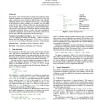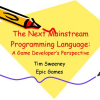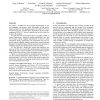218
click to vote
POPL
2006
ACM
16 years 2 months ago
2006
ACM
In POPL 2002, Petrank and Rawitz showed a universal result-finding optimal data placement is not only NP-hard but also impossible to approximate within a constant factor if P = NP...
214
click to vote
POPL
2006
ACM
16 years 2 months ago
2006
ACM
We propose a type system based on regular tree grammars, where algebraic datatypes are interpreted in a structural way. Thus, the same constructors can be reused for different typ...
220
click to vote
POPL
2006
ACM
16 years 2 months ago
2006
ACM
Concurrency-related bugs may happen when multiple threads access shared data and interleave in ways that do not correspond to any sequential execution. Their absence is not guaran...
234
click to vote
POPL
2006
ACM
16 years 2 months ago
2006
ACM
We define a type system, which may also be considered as a simple Hoare logic, for a fragment of an assembly language that deals with code pointers and jumps. The typing is aimed ...
218
click to vote
POPL
2006
ACM
16 years 2 months ago
2006
ACM
C++ templates are key to the design of current successful mainstream libraries and systems. They are the basis of programming techniques in diverse areas ranging from conventional...
245
Voted
POPL
2006
ACM
16 years 2 months ago
2006
ACM
We offer a solution to the type inference problem for an extension of Hindley and Milner's type system with generalized algebraic data types. Our approach is in two strata. T...
213
click to vote
POPL
2006
ACM
16 years 2 months ago
2006
ACM
We present staged allocation, a technique for specifying calling conventions by composing tiny allocators called stages. A specification written using staged allocation has a prec...
233
click to vote
POPL
2006
ACM
16 years 2 months ago
2006
ACM
In PLT Scheme, programs consist of modules with contracts. The latter describe the inputs and outputs of functions and objects via predicates. A run-time system enforces these pre...



